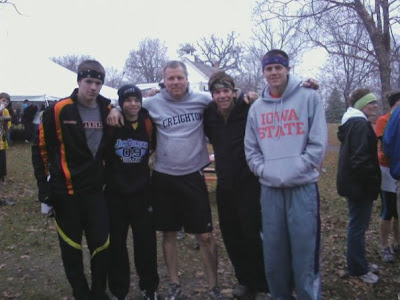Here is a video of the same race with the highlights and post race activities with Team Wiemers:

Zac, Jacob, Galyn, Hawkeye, Benjamin
Galyn Wiemers
http://www.generationword.com/
Generation Word is a Bible teaching ministry of Galyn Wiemers that provides online verse by verse Bible teaching and a Bible school program. Visit www.generationword.com





Geisler writes:All of this Hank is fond of calling “Reading the Bible for all it is worth.” Well, for all it is worth, this is not reading the Bible; it is a serious misreading of the Bible. So serious a misreading it is that were it a reading on an essential doctrine of the Bible – like the virgin birth, the sacrificial atonement, the bodily resurrection, or the second coming–it would be a rank heresy!
I do not desire to attack amillennialism or postmillennialism (I disagree with their interpretation, but not their love of God and pursuit of the truth), but I certainly want to defend historical premillennialism, and even more, dispensational premillennialism. I want believers to have a chance to analyze the scriptures and consider the Bible from a dispensational premillennial position with out having to academically succumb to the label "heretic" as is applied to them by Reformers, Covenantalist (Supersessionists), or their younger counterparts found among the Evangelicals and Emergers.
Thank you C.S. Lewis.Everyone has warned me not to tell you what I am going to tell you in this last book. They all say `the ordinary reader does not want Theology; give him plain practical religion'. I have rejected their advice. I do not think the ordinary reader is such a fool. Theology means 'the science of God,' and I think any man who wants to think about God at all would like to have the clearest and most accurate ideas about Him which are available. You are not children: why should you be treated like children?
In a way I quite understand why some people are put off by Theology. I remember once when I had been giving a talk to the R.A.F., an old, hard-bitten officer got up and said, `I've no use for all that stuff. But, mind you, I'm a religious man too. I know there's a God. I've felt Him out alone in the desert at night: the tremendous mystery. And that's just why I don't believe all your neat little dogmas and formulas about Him. To anyone who's met the real thing they all seem so petty and pedantic and unreal !'
Now in a sense I quite agreed with that man. I think he had probably had a real experience of God in the desert. And when he turned from that experience to the Christian creeds, I think he really was turning from something real to something less real. In the same way, if a man has once looked at the Atlantic from the beach, and then goes and looks at a map of the Atlantic, he also will be turning from something real to something less real: turning from real waves to a bit of coloured paper. But here comes the point. The map is admittedly only coloured paper, but there are two things you have to remember about it. In the first place, it is based on what hundreds and thousands of people have found out by sailing the real Atlantic. In that way it has behind it masses of experience just as real as the one you could have from the beach; only, while yours would be a single glimpse, the map fits all those different experiences together. In the second place, if you want to go anywhere, the map is absolutely necessary. As long as you are content with walks on the beach, your own glimpses are far more fun than looking at a map. But the map is going to be more use than walks on the beach if you want to get to America.
Now, Theology is like the map. Merely learning and thinking about the Christian doctrines, if you stop there, is less real and less exciting than the sort of thing my friend got in the desert. Doctrines are not God: they are only a kind of map. But that map is based on the experience of hundreds of people who really were in touch with God-experiences compared with which any thrills or pious feelings you and I are likely to get on our own are very elementary and very confused. And secondly, if you want to get any further, you must use the map. You see, what happened to that man in the desert may have been real, and was certainly exciting, but nothing comes of it. It leads nowhere. There is nothing to do about it. In fact, that is just why a vague religion-all about feeling God in nature, and so on-is so attractive. It is all thrills and no work; like watching the waves from the beach. But you will not get to Newfoundland by studying the Atlantic that way, and you will not get eternal life by simply feeling the presence of God in flowers or music. Neither will you get anywhere by looking at maps without going to sea. Nor will you be very safe if you go to sea without a map.
In other words, Theology is practical: especially now. In the old days, when there was less education and discussion, perhaps it was possible to get on with a very few simple ideas about God. But it is not so now. Everyone reads, everyone hears things discussed. Consequently, if you do not listen to Theology, that will not mean that you have no ideas about God. It will mean that you have a lot of wrong ones - bad, muddled, out-of-date ideas. For a great many of the ideas about God which are trotted out as novelties to-day are simply the ones which real Theologians tried centuries ago and rejected. To believe in the popular religion of modern England is retrogression - like believing the earth is flat.
 The question and answer below was taken from an interview with George Barna concerning his 2009 book "The Seven Faith Tribes":
The question and answer below was taken from an interview with George Barna concerning his 2009 book "The Seven Faith Tribes": of the matter is our children have been lost long before sitcoms, schools and socialism got a hold of them.
of the matter is our children have been lost long before sitcoms, schools and socialism got a hold of them.The research data showed that one pattern emerged loud and clear: young adults rarely possess a biblical worldview. The current study found that less than one-half of one percent of adults in the Mosaic generation – i.e., those aged 18 to 23 – have a biblical worldview, compared to about one out of every nine older adults.0.5% of people ages 18-23 believe in absolute truth, a creator, sin nature, the existence of evil, marriage, family, etc. Now, the argument would be that they once did before they graduated from our public schools, went to our morally corrupt universities and started seeing Hollywood movies. But, you do not have the numbers to support this. These kids are lost before their parents are done with them.